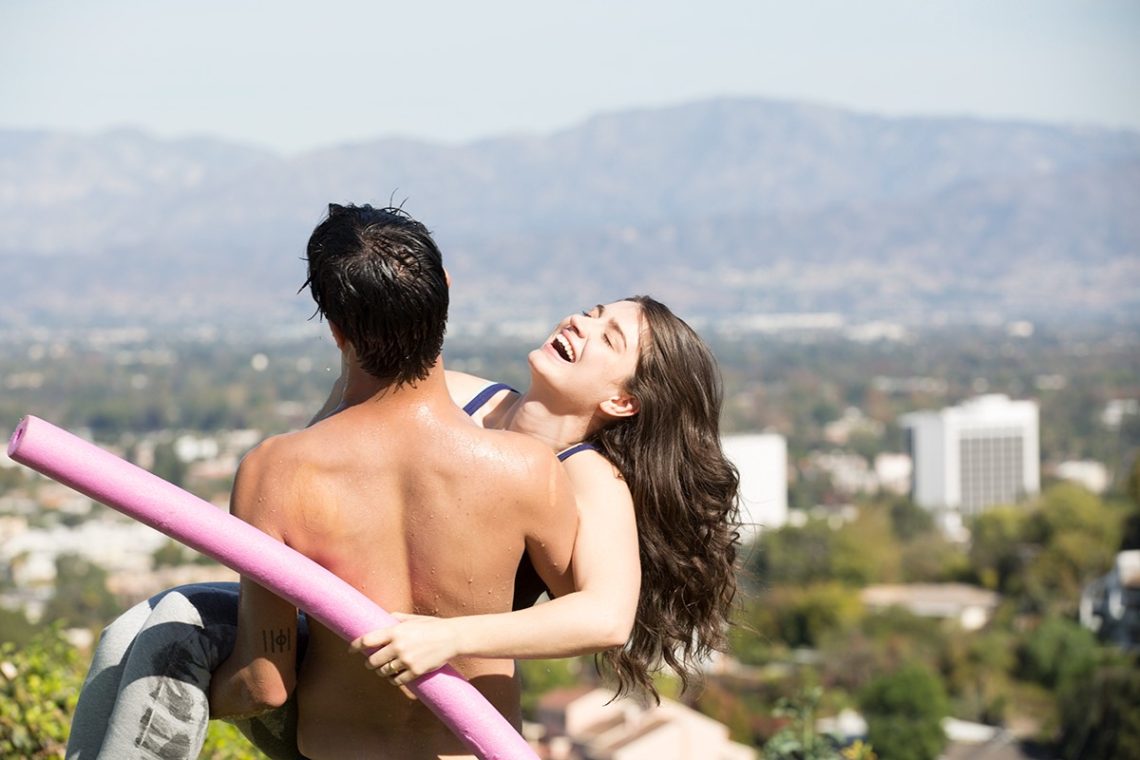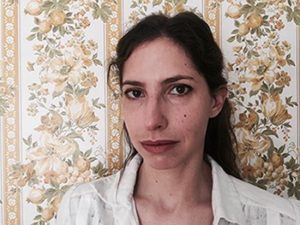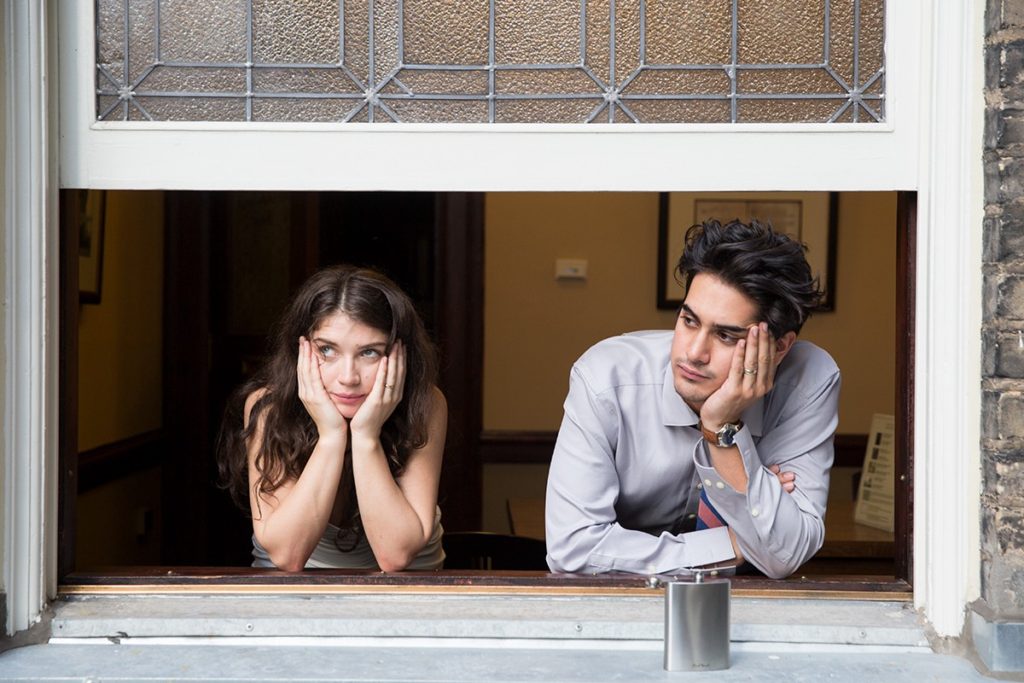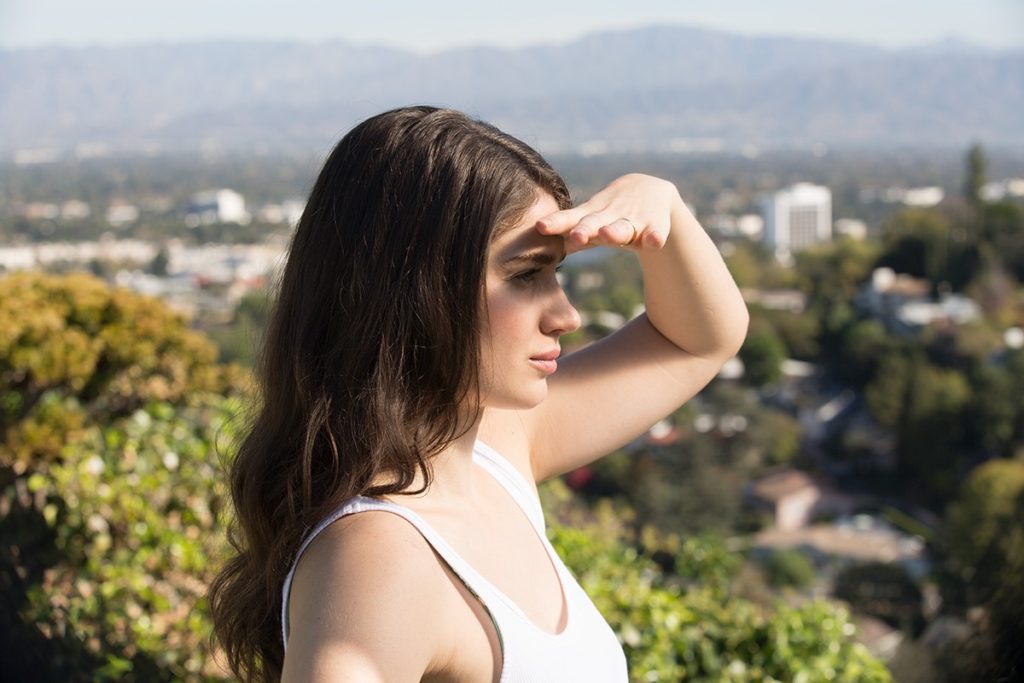
Paper Year Interview: Rebecca Addelman
“Filmmaking for me is a very personal thing, and what I write and the stories I tell are reflections of how I see the world. I can’t divorce that point of view from my experience as a woman.”
Paper Year, the directorial debut from Rebecca Addelman, explores the first year of marriage between two young creatives in Los Angeles. The film centres around Franny (Eve Hewson), a television writer who gets her first job at a game show, and a stalled actor/dog sitter Dan (Avan Jogia).
Sex, love and ambition are at the forefront of this beautifully raw film. I went in thinking I knew where it was going but it surprised me. It doesn’t glamorize life, it shows it exactly as it is: messy, complicated, confusing, and exhilarating.
 At the beginning of the film, Franny and Dan have no money, no job, and no prospects, but they are happy. As Franny gets her dream job and starts to excel, Dan feels insecure—abandoned. Their youthful innocence quickly fading away into uncomfortable realness.
At the beginning of the film, Franny and Dan have no money, no job, and no prospects, but they are happy. As Franny gets her dream job and starts to excel, Dan feels insecure—abandoned. Their youthful innocence quickly fading away into uncomfortable realness.
Addelman created two complex characters and shoots them in a way that makes you feel like you are experiencing these exciting, emotional, and embarrassing moments right alongside them. Paper Year is a fantastic debut from the Canadian comedy writer who has worked on Adult Swim’s China, Fox’s The New Girl, and most recently Netflix’s Love.
PAPER YEAR had its world premiere at the Calgary Underground Film Festival on April 19, 2018.
Tell us a little bit about yourself and how you got involved with filmmaking.
RA: I came to filmmaking as a writer. From early in my life, I’ve worked as a writer in some capacity or another — in my early twenties I was a journalist and when I was twelve I was a poet.
I started to do live comedy in Toronto back in 2004/2005, and that’s when things really started to change for me. I was obsessed with comedy! I wanted to do all things comedy all the time. And so I concentrated my writing on learning how to write for TV (I always felt like TV was where women and female characters had the freedom to be funniest, starting with Lucille Ball, Carol Burnett, Mary Tyler Moore, up to Tina Fey, Broad City, Sharon Horgan, Phoebe Waller-Bridge, etc.).
I eventually started working on American sitcoms and other comedy shows in LA. But the thing with being a staff writer on a television show is that you’re never working alone. You work alongside five to fifteen other writers. It can be beautiful and awesome and so fun, but it doesn’t leave a lot of room for personal, artistic expression. The best way to really maintain creative control and to determine the fate of something you’ve written for film or TV is to also direct it. And so that’s what I decided to do. I wrote the script for Paper Year, which is a very personal script, and a friend read it and said: “You should direct this.” After he uttered those words, I never considered not directing it. He flipped a switch inside me and I decided it was time to make something that was truly my own.
Tell us about Paper Year. Where did the idea come from?
RA: Paper Year is very loosely inspired by my life. I got married when I was quite young. I was in love but I was also impulsive and, let’s be honest, way too sure of myself. I was positive that I knew everything there was to know about myself and that the decision I made at 25 was undeniably the best one for me for the rest of my life. What I learned in my marriage — and then my divorce — is that we continue to grow, to change, to become newer, different versions of ourselves. I also learned that it’s dangerous to ever think you know exactly how your life will turn out. Because guess what? You don’t!
In Paper Year, writing plays a large part in the story. Franny has a stable writing job where she bonds with her boss and Hailey Turner’s notebook provides an intimacy between her and Dan. Why did you choose to use the characters writing as a plot device?
RA: In Paper Year, the main character, Franny, is also a television writer and she lands her first real job — a job where she’s the only female writer alongside two men. These men both behave pretty terribly toward Franny, but in very different ways. (And they both represent people I encountered in my career.) I wanted to get across the feeling of being a 22-year-old woman who’s trying to succeed in her dream career but has to navigate a very male, very loaded workplace. Needless to say, Franny’s path isn’t smooth.

Can you explain what Goosed is about, I’m fascinated?
RA: You mean you don’t understand Goosed from the 90 seconds of screen time it gets in the movie?? Goosed was originally based on game shows like Oh, Sit! or Wipeout (For those who haven’t seen Oh, Sit! it’s basically full-contact musical chairs.) My version, Goosed, was going to be like a full-contact Duck, Duck, Goose game — contestants had to chase each other through an obstacle course and be the first to sit in an empty chair at the end that represents the finish line. I really felt like this kind of gameshow would be a believable “first job” for Franny. I really wanted her to get a job writing for television, but I wanted it to be many generations away from what her dream job in television would actually be: writing for an excellent comedy show. As we developed the practical components of Goosed for Paper Year, it became a little bit more like American Gladiators / American Ninja Warrior and less about duck, duck, goose.
The scene between Franny and her boss in the car is very raw, and uncomfortable. You see multiple angles, including what she would be looking at. Why did you decide to film it like this?
RA: I had a lot of plans for this scene. I really wanted to see and feel it all from Franny’s perspective. And the most important thing for me was to have the viewer feel all fantasy and romance completely disappear. There is nothing romantic about this moment. It’s as if the bottom fall’s out of Franny’s imagined reality, and she’s stuck with the hard truth of the situation she’s put herself in. But, to be honest, a lot of the practical filmmaking choices were dictated by the facts on the ground: turned out the location we chose (a street under an overpass) wasn’t locked off — this meant that we couldn’t control traffic. So, if you can imagine, we were shooting a sex scene in a car and there were pedestrians walking by! Thankfully, it was 2 in the morning in a semi-deserted part of town. But still, we had a few people and cars pass through the scene. It was also freezing cold that night, and the poor actors had to take their pants off and be partly nude in the backseat of a car… I quickly realized that the faster we could shoot this scene, the better off everyone would be. So we chose a few key angles and let ‘er rip!
Can you tell us about some/all of the other amazing women who worked on this film?
RA: First and foremost, there’s Eve Hewson. Eve is the star of the movie and the beating heart of the whole damn thing. She’s in almost every scene, and often the frame is just her face. I was so lucky that Eve liked the script and wanted to do this movie. She’s an amazing actor and just so, so… good! She has a naturalism that is disarming, but a complete mastery of her technique and her emotional range so that it makes for this amazing combination of a person who is so authentic and brimming with emotion at the same time. Plus, she was phenomenal and fun to work with. She’s a cool, funny, whipsmart person and game for anything. I love her and deeply respect her.
The other women to mention are Christina Piovesan and Jennifer Shin, my bad-ass, totally amazing producers. From the very beginning, Christina was this movie’s biggest champion. She’s this tough, loud, hilarious, ballsy young woman who is incredibly passionate about making great film. She never sleeps — she’s always working and trying to get the money she needs to get her movies made. It’s truly incredible. She’s a warrior! And Jennifer… well, she’s a kind of superhuman. She was there every day and night during pre-production taking care of every last detail, making sure I and the movie had everything we needed. She was my main source of support and collaboration. And she still is! As I write this, Jen is planning and launching the Paper Year Instagram page. She’s the absolute best.
Tell us about why you are a feminist and why it’s important to your filmmaking.
RA: I’m a feminist because I don’t comprehend the idea that because of who I am / how I was born / what body parts I have that I am somehow inferior and deserving of less. It just doesn’t compute in my brain — why should I be paid 20 cents less on a dollar than another person who does the exact same thing as me? It’s completely illogical and yet it’s reality. I think that if you don’t accept the status quo and you know that women are equal (or beyond equal), then you are a feminist.
Filmmaking for me is a very personal thing, and what I write and the stories I tell are reflections of how I see the world. I can’t divorce that point of view from my experience as a woman.
Who are your favourite women working in the film industry?
RA: This is a funny question because at this point I think it should just be “who are my favourite people in the film industry” — there are so many! I love Christina and Jen, my producers, obviously. And the various mentors I’ve had, like Kay Cannon and Ali Rushfield and Ali Waller, and people who I’ve worked with who were encouraging and inspiring, like Lorene Scafaria and Lynn Shelton and Betty Thomas. I also love the work of Nicole Holofcener, Andrea Arnold, Gillian Robsepierre, and Lisa Cholodenko. Two of the best films I’ve seen this decade were made by women: Mustang (Deniz Gamze Erguven) and Toni Erdmann (Maren Ade).

What’s the best advice about filmmaking you’ve ever received?
RA: It came from my lovely partner, who himself is also a filmmaker — when you make a movie, you’re actually making three movies: there’s the movie you’ve written, the movie you’ve shot, and the movie you edit together. He’s right. The whole movie changes as you cycle through the stages of creating it. And at each stage, you have to work with what you’ve got and make the most of it.
What are you working on now/next?
RA: I’m writing two more features that I plan to direct. I’m also pitching my own TV show.
If you were reincarnated as an ice cream flavour, what would it be?
RA: Lemon gelato… irresistibly sour!! That’s me.
If you could live in any sitcom, which one would it be?
RA: Cheers seems like a fun place to hang out, I guess? Though I don’t really drink…
Finally, recommend one #MUFFApproved film for our blog readers!
RA: Mustang and Toni Erdmann! They are both so good. Mustang because it’s so powerfully sad. Toni Erdmann because it’s so hilarious and touching.
*This post originally appeared on The MUFF Society*
Stay up to date with Paper Year via their Instagram.
